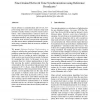Free Online Productivity Tools
i2Speak
i2Symbol
i2OCR
iTex2Img
iWeb2Print
iWeb2Shot
i2Type
iPdf2Split
iPdf2Merge
i2Bopomofo
i2Arabic
i2Style
i2Image
i2PDF
iLatex2Rtf
Sci2ools
124
click to vote
OSDI
2002
ACM
2002
ACM
Fine-Grained Network Time Synchronization Using Reference Broadcasts
Recent advances in miniaturization and low-cost, lowpower design have led to active research in large-scale networks of small, wireless, low-power sensors and actuators. Time synchronization is critical in sensor networks for diverse purposes including sensor data fusion, coordinated actuation, and power-efficient duty cycling. Though the clock accuracy and precision requirements are often stricter than in traditional distributed systems, strict energy constraints limit the resources available to meet these goals. We present Reference-Broadcast Synchronization, a scheme in which nodes send reference beacons to their neighbors using physical-layer broadcasts. A reference broadcast does not contain an explicit timestamp; instead, receivers use its arrival time as a point of reference for comparing their clocks. In this paper, we use measurements from two wireless implementations to show that removing the sender's nondeterminism from the critical path in this way produces high-preci...
Nodes Send Reference | Operating System | OSDI 2002 | Sensor Data Fusion | Strict Energy Constraints |
Related Content
| Added | 03 Dec 2009 |
| Updated | 03 Dec 2009 |
| Type | Conference |
| Year | 2002 |
| Where | OSDI |
| Authors | Jeremy Elson, Lewis Girod, Deborah Estrin |
Comments (0)

